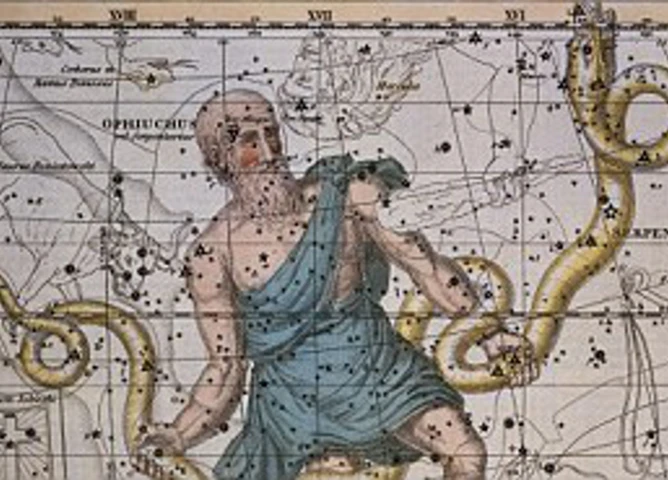Deep in the annals of ancient mythology lies a figure shrouded in mystery and controversy. Known as Ophiuchus, this enigmatic character has captivated the imaginations of scholars and storytellers for centuries. Was Ophiuchus a hero, revered for their brave deeds and wisdom, or a villain, condemned for their transgressions and acts of betrayal? In this article, we will delve into the background of Ophiuchus, explore their portrayal as both hero and villain, examine the interpretations and controversies surrounding their character, and discuss their modern perception in popular culture. Join us on this journey through ancient tales as we attempt to unravel the truth behind Ophiuchus, a figure caught between the realms of heroism and villainy.
Contents
- Background of Ophiuchus
- Ophiuchus as a Hero
- Ophiuchus as a Villain
- Interpretations and Controversies
- Modern Perceptions and Apprehensions
- Conclusion
- Frequently Asked Questions
- References
-
Frequently Asked Questions
- 1. Who is Ophiuchus in ancient stories?
- 2. What is the origin of the Ophiuchus myth?
- 3. What are some notable feats and accomplishments of Ophiuchus?
- 4. Is Ophiuchus considered a hero or a villain?
- 5. What is the symbolism behind Ophiuchus?
- 6. What are some negative depictions of Ophiuchus?
- 7. How does Ophiuchus relate to astrology?
- 8. How is Ophiuchus portrayed in popular culture?
- 9. Are there any modern reinterpretations of Ophiuchus?
- 10. How has the perception of Ophiuchus evolved over time?
- References
- Read More
Background of Ophiuchus
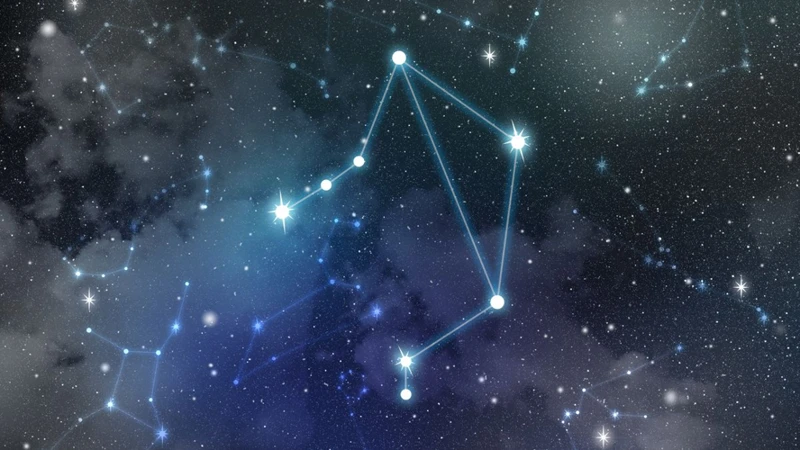
The background of Ophiuchus is a fascinating and complex tapestry, woven from various ancient sources and beliefs. Its origins can be traced back to both Greek and Babylonian mythologies. In Greek mythology, Ophiuchus is associated with Asclepius, a legendary figure renowned for his remarkable healing abilities. Asclepius was said to possess the power to bring the dead back to life, a feat that eventually led to his downfall. In Babylonian mythology, Ophiuchus was connected to the serpent god Ningishzida, who represented fertility and the cycle of life and death. These diverse mythical elements combined to form the enigmatic character we know as Ophiuchus. It is worth noting that Ophiuchus also holds astronomical significance, as it represents the 13th zodiac sign in some systems of astrology, challenging the traditional 12-sign zodiac widely recognized today. This connection to astrology has sparked debates and controversies, igniting a renewed interest in Ophiuchus’s story and its potential impact on astrological interpretations. To fully comprehend Ophiuchus, we must delve deeper into the myths and legends that have shaped its identity, exploring the heroic and villainous aspects that have captivated the human imagination throughout history.
The Origins of Ophiuchus
The origins of Ophiuchus are rooted in ancient mythology, with its earliest connections to Greek and Babylonian cultures. In Greek mythology, Ophiuchus is closely tied to the figure of Asclepius, the god of healing and medicine. Asclepius was known for his extraordinary ability to cure illnesses and even raise the dead, which later caused conflict with Hades, the god of the Underworld. In Babylonian mythology, Ophiuchus finds its origins in Ningishzida, the serpent god associated with fertility and the cycle of life and death. Both of these mythological threads intertwine to form the foundation of Ophiuchus, a complex and enigmatic character whose story continues to intrigue and inspire. By exploring the rich tapestry of ancient tales, we can begin to unravel the origins and significance of Ophiuchus, shedding light on its dual role as both a hero and a villain in ancient stories. For further reading on celestial wonders, you may be interested in our article on the best meteor showers throughout the year, or explore the fascinating world of mathematical mysteries in the secrets of Mayan mathematics.
Ophiuchus in Mythology
Ophiuchus holds a prominent place in mythology, appearing in various ancient tales and legends. In Greek mythology, Ophiuchus is associated with Asclepius, the son of Apollo, god of healing and medicine. Asclepius possessed incredible healing abilities and was revered for his knowledge and wisdom. According to one myth, Asclepius was taught the art of healing by the centaur Chiron, who instructed him in the use of medicinal plants and the secrets of surgery. Asclepius became so skilled at healing that he could even resurrect the dead. This extraordinary power drew the attention of the gods, particularly Hades, the ruler of the underworld. Suspicious of Asclepius’ ability to cheat death, Hades complained to Zeus, the king of the gods. In response, Zeus struck Asclepius with a thunderbolt, ending his life. Outraged at the loss of such a skilled healer, Apollo begged Zeus to bring Asclepius back. Although Zeus denied his request, he immortalized Asclepius by transforming him into the constellation Ophiuchus in the night sky, forever memorializing his wisdom and healing prowess. Ophiuchus’s presence in mythology conveys the significance of healing and the delicate balance between life and death. Its story serves as a reminder of the power of medicine and the eternal quest for immortality. The connection between Ophiuchus and healing has even influenced the medical profession, as the symbol of the serpent coiled around a staff, known as the Rod of Asclepius, is still used as a symbol of medicine today. To explore the role of Ophiuchus in astrology, please refer to our article on Uranus: Individuality and Revolutionary Energy in Astrology.
Ophiuchus as a Hero
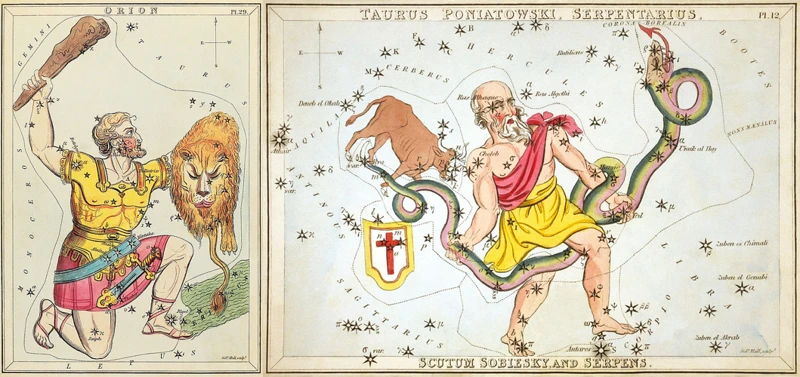
Ophiuchus is often depicted as a heroic figure, celebrated for their remarkable feats and embodiment of noble qualities. Let’s delve into some of the key aspects of Ophiuchus as a hero:
Ophiuchus is renowned for their extraordinary healing abilities and medical knowledge. In Greek mythology, Ophiuchus embodies the god Asclepius, who possesses the power to cure the gravest of illnesses and even revive the dead. This incredible skillset sets Ophiuchus apart as a hero who brings hope and restoration to those in need. Their feats of healing become a beacon of light in times of darkness and despair, elevating them to a revered status among both mortals and gods.
As a healer, Ophiuchus symbolizes the power of knowledge and wisdom in the pursuit of well-being. Their dedication to understanding the intricate workings of the human body and the remedies for ailments establishes them as a source of immense wisdom. Ophiuchus’s serpent symbol represents regeneration and rebirth, further emphasizing their connection to the cycles of life and the healing process. This association with wisdom and healing positions Ophiuchus as a guiding figure, offering solace and enlightenment to those in search of it.
Ophiuchus’s role as a hero is defined by their exceptional healing abilities, remarkable accomplishments, and embodiment of wisdom. Their contribution to society as healers and bringers of hope solidifies their status as a figure to be admired and revered. The symbol of Ophiuchus in mythology continues to inspire all those who believe in the power of healing, both physically and spiritually.
Feats and Accomplishments
Ophiuchus, surrounded by an aura of mystique, boasts an impressive array of feats and accomplishments. First and foremost, they are celebrated for their unparalleled healing abilities, which surpass those of any mortal. Ophiuchus possessed the remarkable power to cure diseases, mend wounds, and even revive the dead. Their skills were so extraordinary that they were revered as the patron of medicine and worshipped as a deity in some cultures. Legends abound with tales of Ophiuchus traversing the realms of life and death, bringing solace to suffering individuals and offering hope where it seemed lost. Their ability to restore health and well-being to the afflicted solidified their status as a symbol of healing and compassion. Ophiuchus’s feats exemplify the embodiment of benevolence and the relentless pursuit of restoring harmony to the world. Their awe-inspiring accomplishments continue to fascinate and inspire, leaving an indelible mark on the collective consciousness of humanity.
Symbol of Healing and Wisdom
Ophiuchus holds a prominent place as a symbol of healing and wisdom in ancient tales. In Greek mythology, the association with Asclepius, the renowned healer, exemplifies Ophiuchus’s connection to medicinal practices and the pursuit of knowledge. Asclepius was revered for his ability to heal the sick and injured, even bringing the dead back to life through his extraordinary skills. Ophiuchus, as a representation of Asclepius, embodies these healing abilities and is often depicted with a serpent entwined around a staff, called the Rod of Asclepius, which has become a universal symbol of medicine and healing. This intertwining of the serpent on the staff represents the balance between life and death, as well as the transformation and regeneration that can occur through the healing process. Ophiuchus’s wisdom is also evident through their ability to navigate the intricate realms of life, death, and the natural world. Their association with the serpent further emphasizes their connection to wisdom, as serpents were often seen as symbols of knowledge and transformation in many cultures. Ophiuchus’s significance as a symbol of healing and wisdom transcends mythology, resonating with the human desire for knowledge and the search for physical and emotional well-being.
Ophiuchus as a Villain
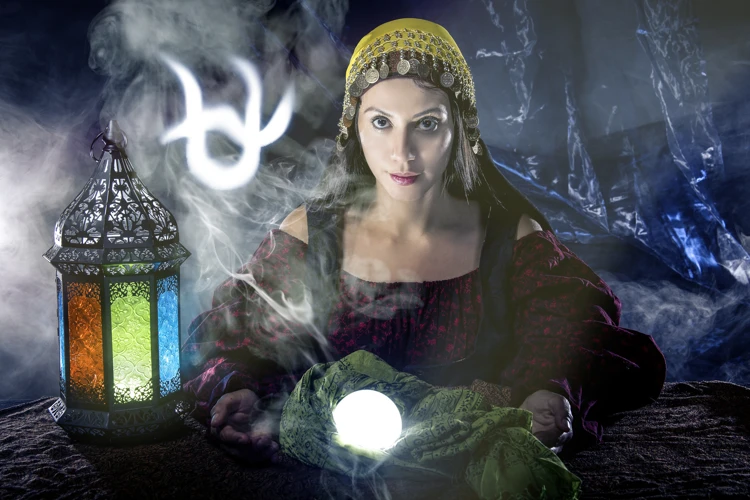
Ophiuchus, despite being revered as a hero in some tales, also carries a darker reputation as a villain in ancient stories. The character’s transgressions and consequences are depicted in various myths and legends, showcasing their morally ambiguous nature. One such tale portrays Ophiuchus as a figure who challenged the natural order and faced dire consequences as a result. In this story, Ophiuchus seeks to surpass the gods by obtaining the coveted secret of immortality. Their audacious ambition and willingness to defy divine authority cast them in the role of a villain, as they dared to challenge the established power structure. Ophiuchus’s actions disrupted the balance of the cosmos, leading to chaos and wrath from the gods. Their ambition and thirst for power resulted in severe punishment, often depicted as relentless suffering or eternal torment. Symbolically, Ophiuchus’s portrayal as a villain suggests the dangers of overstepping boundaries and the consequences that arise from unchecked ambition and rebellion. The character becomes a cautionary figure, warning individuals of the potential pitfalls that await those who dare to challenge the divine order. This conflicting depiction of Ophiuchus as both hero and villain showcases the complexities of their character and invites further interpretation and analysis. Whether seen as a symbol of betrayal and manipulation or as someone who pays the price for their audacity, Ophiuchus’s villainous representation contributes to the richness and ambiguity of their mythological persona.
Transgressions and Consequences
Within the intricate tales surrounding Ophiuchus, there are accounts of transgressions committed by this enigmatic figure, which led to dire consequences. One notable transgression attributed to Ophiuchus is the act of challenging the natural order and attempting to cheat death itself. As a healer with remarkable restorative powers, Ophiuchus was able to revive the deceased, disrupting the established cycle of life and death. This audacious defiance of the gods and the natural order brought about severe consequences, as it upset the delicate balance of the cosmos. The consequences of Ophiuchus’ actions were said to be far-reaching, resulting in the wrath of the gods and an inevitable downfall. These transgressions and their subsequent consequences add a dark and complex dimension to Ophiuchus’ character, blurring the lines between heroism and villainy and fueling the ongoing controversy surrounding this enigmatic figure from ancient tales.
Symbol of Betrayal and Manipulation
Ophiuchus, in certain ancient stories, is depicted as a symbol of betrayal and manipulation. One of the key narratives that have contributed to this perception is the story of Ophiuchus and Orion. According to Greek mythology, Orion was a legendary hunter known for his strength and courage. However, Orion’s arrogance and boastfulness earned him the ire of the gods. In a cunning plan orchestrated by Ophiuchus, Orion was stung by a scorpion and died. This act of treachery is often seen as a symbol of Ophiuchus’s manipulative nature, utilizing deception to achieve their desired outcome. Ophiuchus’s involvement in Orion’s demise exemplifies betrayal, as they turned against someone who was once considered an ally. This portrayal of Ophiuchus as a figure associated with deceit and backstabbing has firmly established its reputation as a symbol of betrayal and manipulation in ancient mythology.
Additionally, Ophiuchus’s association with snakes further reinforces this notion. In many cultures, snakes symbolize cunning, slyness, and trickery. Ophiuchus’s close connection with serpents, evident in depictions where they are often seen holding or accompanied by snakes, further solidify the perception of Ophiuchus as a character embodying manipulation and deceit.
It is essential to note, however, that interpretations of Ophiuchus can vary, and not all ancient stories paint them in a negative light. The context and cultural lens through which these tales are viewed can greatly influence the perception of Ophiuchus as either a hero or a villain. The multifaceted nature of Ophiuchus, characterized by both positive and negative aspects, adds depth and intrigue to their role in ancient mythology.
Interpretations and Controversies

Interpretations and controversies surrounding Ophiuchus have persisted throughout history, as differing narratives and perspectives have shaped the perception of this enigmatic figure. One point of contention lies in the positive and negative depictions of Ophiuchus. Some view Ophiuchus as a symbol of healing and wisdom, lauding their remarkable feats and accomplishments. They are revered as a hero, wielding the power to cure the sick and restore life. Others, however, see Ophiuchus in a more negative light, focusing on their transgressions and consequences. Ophiuchus is sometimes portrayed as a manipulative and deceitful character, using their powers for personal gain at the expense of others. This dichotomy of interpretations has led to ongoing debate and discussion among scholars and enthusiasts.
Another source of controversy stems from the role of Ophiuchus in astrology. Traditionally, astrology follows a 12-sign zodiac system, but the inclusion of Ophiuchus as a 13th sign has sparked disagreements and uncertainties. Some astrologers argue for the incorporation of Ophiuchus, highlighting its potential influence on individual horoscopes and personality traits. Others dismiss it as an unnecessary addition, advocating for the preservation of the traditional zodiac. This controversy has fueled a reevaluation of astrology itself, prompting further exploration of individuality and revolutionary energy within the realm of celestial interpretations.
Interpretations and controversies surrounding Ophiuchus are deeply rooted in both its portrayal as a hero or a villain, as well as its connection to astrology. The diverse perspectives and debates surrounding its character force us to question traditional beliefs and delve into the significance of Ophiuchus in both ancient tales and contemporary astrological understandings. It is through these ongoing discussions that we can begin to unravel the complex nature of Ophiuchus and its place in our cultural imagination.
Positive and Negative Depictions
Positive and negative depictions of Ophiuchus throughout history have showcased the dual nature of this mysterious figure. On one hand, Ophiuchus is often portrayed as a hero, revered for their remarkable feats and accomplishments. Their symbol as a serpent bearer and healer signifies their association with wisdom and knowledge. Ophiuchus is seen as a symbol of healing, with the ability to restore life and bring about miraculous recoveries. This positive depiction emphasizes their role as a bringer of hope and salvation. However, Ophiuchus also carries a darker side, with tales of transgressions and consequences adding complexity to their character. Some versions of the myth portray Ophiuchus as a villain, charting a path of betrayal and manipulation. These negative depictions highlight their misuse of power, leading to their downfall and punishment. Despite the contrasting interpretations, one thing remains certain – Ophiuchus holds a prominent place in ancient stories, embodying a combination of heroic ideals and sinister tendencies.
Role in Astrology
Role in Astrology
Ophiuchus plays a unique and controversial role in the realm of astrology. Traditionally, astrology follows a system of 12 zodiac signs, each corresponding to a specific period of the year. However, the emergence of Ophiuchus as the 13th zodiac sign has added a layer of complexity to this ancient practice. Those who advocate for the inclusion of Ophiuchus argue that its addition creates a more accurate representation of celestial alignments and individuals’ personalities. They propose that Ophiuchus embodies qualities such as healing, wisdom, and transformation, which are not fully captured by the existing zodiac signs.
However, not all astrologers embrace Ophiuchus into their practice. Skeptics argue that adding another zodiac sign disrupts the established system and creates confusion among astrology enthusiasts. They contend that the 12-sign zodiac has been in use for centuries, and altering it would undermine its reliability and diminish the accuracy of astrological readings. Additionally, the alignment of the constellations with the zodiac signs has shifted over time due to the Earth’s precession, leading to further debate and discrepancies regarding the role of Ophiuchus in astrology.
Regardless of whether one recognizes Ophiuchus as a valid zodiac sign, its existence has sparked intriguing discussions about the influence of celestial bodies on human lives. Astrology enthusiasts may choose to explore the traits attributed to Ophiuchus and incorporate them into their astrological interpretations. The controversy surrounding Ophiuchus encourages a deeper exploration of the ancient wisdom and symbolism associated with the constellations and their impact on our understanding of ourselves and the world around us.
Modern Perceptions and Apprehensions
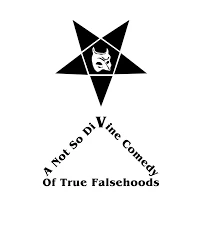
Modern perceptions and apprehensions surrounding Ophiuchus are varied and intriguing. In popular culture, Ophiuchus has gained attention in recent years, with references appearing in books, movies, and even video games. This newfound interest has sparked a reevaluation of ancient tales and a fresh exploration of Ophiuchus’s role as a hero or a villain. Some view Ophiuchus as a symbol of untapped potential and hidden knowledge, representing the pursuit of wisdom and healing. They see the character as an embodiment of the complexities and contradictions of human nature, reminding us that heroes can have flaws and villains can possess redeeming qualities. Others, however, remain apprehensive about the inclusion of Ophiuchus in astrology. Traditional astrological systems have long been established and deeply ingrained in society, and the introduction of a 13th zodiac sign disrupts this familiar framework. There is concern that embracing Ophiuchus could undermine the carefully constructed interpretations and meanings associated with the existing zodiac signs. This apprehension is further fueled by the ongoing debate among astrologers and enthusiasts about Ophiuchus’s true significance and its potential impact on the field. Despite the divide in opinions, Ophiuchus continues to capture the imagination of many, sparking discussions, reevaluations, and a renewed curiosity about the complexities of heroes and villains in ancient stories.
Ophiuchus in Popular Culture
Ophiuchus has made its way into popular culture, leaving an indelible mark on various forms of media. From literature to films and even video games, Ophiuchus has become a symbol of intrigue and mystique. In literature, authors have reimagined Ophiuchus as a complex, morally ambiguous character, blurring the lines between hero and villain. Their healing abilities and wisdom are often depicted as a double-edged sword, capable of both salvation and manipulation. In movies and television shows, Ophiuchus has been portrayed as a charismatic and enigmatic figure, embodying both the allure of a hero and the sinister nature of a villain. The rise in interest surrounding Ophiuchus in popular culture has also led to a reevaluation of ancient tales, prompting scholars and enthusiasts alike to delve deeper into the character’s origins and symbolism. As Ophiuchus continues to make its presence known in popular culture, its influence on storytelling and entertainment only grows, captivating audiences with its enigmatic persona and complex nature.
Reevaluation of Ancient Tales
Reevaluation of Ancient Tales:
1. Different Perspectives: The reevaluation of ancient tales involving Ophiuchus has been crucial in understanding the complexity of this enigmatic figure. Scholars and researchers have approached the stories from various perspectives, bringing forth new insights and interpretations.
2. Historical Context: One aspect of the reevaluation revolves around examining the historical context in which these tales were created. By considering the cultural, social, and political factors of the time, we can gain a deeper understanding of the symbolism and meaning embedded within the stories of Ophiuchus.
3. Psychological Analysis: Another approach to the reevaluation involves delving into the psychological aspects of the characters involved. Through psychological analysis, researchers aim to uncover the underlying motivations and desires that drive Ophiuchus and other characters in the ancient tales.
4. Cultural Significance: The reevaluation process also involves analyzing the cultural significance of Ophiuchus in different civilizations. By comparing and contrasting Ophiuchus’s portrayal across different mythologies, we can uncover common themes and recurring motifs that shed light on the character’s broader symbolic importance.
5. Archetypal Examination: Ophiuchus’s character has also been subjected to archetypal examination, where researchers explore how this figure aligns with universal patterns and symbols found in mythology and storytelling. This approach helps reveal the deeper archetypal connections that Ophiuchus holds within the collective human psyche.
Through these reevaluations, ancient tales featuring Ophiuchus have been given new life and meaning. The exploration of different perspectives, historical context, psychological analysis, cultural significance, and archetypal examination all contribute to a richer understanding of Ophiuchus and its role in ancient mythology. As these reevaluations continue, we can expect further insights into the complex nature of this captivating figure from the past.
Conclusion

In conclusion, the character of Ophiuchus remains a subject of fascination and debate. Its background, intertwining elements of Greek and Babylonian mythology, adds to its enigmatic nature. Ophiuchus is simultaneously portrayed as both a hero and a villain, with feats and accomplishments on one hand, and transgressions and consequences on the other. These contrasting depictions have led to interpretations and controversies, fueling discussions in both ancient tales and astrology. In modern times, Ophiuchus has made appearances in popular culture, further contributing to its intrigue and reimagining its role in society. As we navigate through the ancient narratives and reassess their meanings, we are invited to question the validity of established perceptions and embrace the complexity of this elusive figure. Whether Ophiuchus is seen as a hero or a villain ultimately depends on individual perspectives and the lenses through which we view ancient stories. The enduring appeal of Ophiuchus lies in its ability to challenge our preconceived notions and continually evolve in our collective consciousness.
Frequently Asked Questions

FAQs about Ophiuchus
1. What does the symbol of Ophiuchus represent in mythology?
The symbol of Ophiuchus represents a combination of healing, wisdom, and the power to manipulate life and death.
2. Is Ophiuchus a commonly known figure in mythology?
Ophiuchus is not as widely recognized as other figures in mythology, but it holds significant importance in certain ancient cultures and astrological systems.
3. What are some notable stories or myths associated with Ophiuchus?
One notable story is the tale of Asclepius, where Ophiuchus represents the Greek god of healing who possess the ability to resurrect the dead, but it leads to unforeseen consequences.
4. How does Ophiuchus fit into astrology?
In astrology, Ophiuchus challenges the traditional 12-sign zodiac system and serves as the 13th zodiac sign in some interpretations. However, its inclusion is a subject of debate and not universally accepted.
5. Are there any negative aspects associated with Ophiuchus?
Yes, Ophiuchus is often portrayed as having a dark side, involving transgressions and acts of betrayal that lead to negative consequences.
6. Is there a connection between Ophiuchus and serpent symbolism?
Yes, Ophiuchus is often depicted as holding or interacting with a serpent, symbolizing its association with healing, rebirth, and wisdom across different mythologies.
7. How has Ophiuchus been portrayed in popular culture?
Ophiuchus has made appearances in various forms of media, including literature, films, and even video games, often showcasing its healing and mystical abilities.
8. What are the controversies surrounding Ophiuchus in astrology?
The inclusion of Ophiuchus as a zodiac sign has created debates among astrologers, with some embracing it and others dismissing it as an unnecessary addition.
9. How has modern society reevaluated ancient tales about Ophiuchus?
Modern society has reexamined ancient stories about Ophiuchus, bringing new interpretations and perspectives to light, often questioning the traditional categorizations of heroes and villains.
10. Can Ophiuchus be seen in the night sky during specific meteor showers?
While Ophiuchus is not directly associated with specific meteor showers, its position in the celestial sphere allows for stunning views of meteor showers throughout the year.
References
Frequently Asked Questions

1. Who is Ophiuchus in ancient stories?
Ophiuchus is a legendary figure in ancient stories, often depicted as a skilled healer and a wise individual with the ability to commune with snakes.
2. What is the origin of the Ophiuchus myth?
The myth of Ophiuchus has its roots in ancient Greek mythology, where he is believed to be the son of Apollo and a mortal woman named Coronis.
3. What are some notable feats and accomplishments of Ophiuchus?
Ophiuchus is known for his remarkable healing abilities and his courage in battling various creatures and monsters. He is also credited with inventing medicine.
4. Is Ophiuchus considered a hero or a villain?
Opinions regarding Ophiuchus vary. Some view him as a hero for his healing powers and wisdom, while others see him as a villain due to his transgressions and manipulation.
5. What is the symbolism behind Ophiuchus?
Ophiuchus is often associated with healing, wisdom, and transformation. Snakes, which were believed to possess healing properties, are frequently depicted in connection with him.
6. What are some negative depictions of Ophiuchus?
In certain myths, Ophiuchus is portrayed as a figure who oversteps his boundaries and defies the gods, resulting in dire consequences for himself and others.
7. How does Ophiuchus relate to astrology?
Ophiuchus is not traditionally included in the 12 Zodiac signs but is sometimes considered the 13th sign in modern astrology, leading to various interpretations and controversies.
8. How is Ophiuchus portrayed in popular culture?
Ophiuchus has made appearances in literature, films, and video games, often depicted as a complex character with mystical powers and a deep connection to nature.
9. Are there any modern reinterpretations of Ophiuchus?
In recent years, there has been a reevaluation of ancient tales, presenting Ophiuchus in a more nuanced light, exploring the complexities of his character and role in mythology.
10. How has the perception of Ophiuchus evolved over time?
Throughout history, the perception of Ophiuchus has shifted, with some cultures venerating him as a hero while others demonize him as a deceptive figure. Modern interpretations continue to shape the understanding of this enigmatic character.

